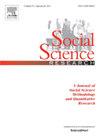Is political interest tracked in schools? Evidence from Germany
IF 3.5
2区 社会学
Q1 SOCIOLOGY
引用次数: 0
Abstract
Motivated by ongoing academic debates about whether education functions as a causal driver or a proxy in shaping sociopolitical outcomes, this study investigates the impact of educational tracking on the development of political interest among youths. Specifically, we examine whether the transition into academic and vocational upper-secondary school tracks affects students’ political interest. We applied a difference-in-differences framework to estimate the causal effect of track placement, drawing on individual-level panel data from the German National Educational Panel Study. The longitudinal design allowed us to observe students at multiple time points: before, during, and after their transition into upper-secondary education. We found that students exhibited different levels of political interest before their upper-secondary tracks, and the academic track had no substantive nor significant causal effect on the development of political interest. We conclude that educational tracking at the upper-secondary level did not actively contribute to the differentiated development of individual political interest and had negligible impact on altering preexisting disparities; its role in shaping civic dispositions might be more limited than often assumed. We call for more research in different contexts and at earlier stages of political socialization.
学校里的政治兴趣被跟踪了吗?来自德国的证据
关于教育在塑造社会政治结果方面是因果驱动因素还是代理因素的学术辩论正在进行,本研究旨在探讨教育跟踪对青少年政治兴趣发展的影响。具体而言,我们考察了向学术和职业高中过渡是否会影响学生的政治兴趣。我们利用德国国家教育小组研究的个人水平小组数据,应用差异中的差异框架来估计轨迹放置的因果效应。纵向设计允许我们在多个时间点观察学生:在他们过渡到高中教育之前,期间和之后。研究发现,中学生政治兴趣在高中阶段前表现出不同程度的差异,学业阶段对政治兴趣的发展没有实质性或显著的因果关系。我们的结论是,高中阶段的教育跟踪对个人政治兴趣的差异化发展没有积极的贡献,对改变先前存在的差异的影响可以忽略不计;它在塑造公民性格方面的作用可能比人们通常认为的要有限。我们呼吁在不同的背景和政治社会化的早期阶段进行更多的研究。
本文章由计算机程序翻译,如有差异,请以英文原文为准。
求助全文
约1分钟内获得全文
求助全文
来源期刊

Social Science Research
SOCIOLOGY-
CiteScore
4.30
自引率
4.00%
发文量
0
审稿时长
65 days
期刊介绍:
Social Science Research publishes papers devoted to quantitative social science research and methodology. The journal features articles that illustrate the use of quantitative methods in the empirical solution of substantive problems, and emphasizes those concerned with issues or methods that cut across traditional disciplinary lines. Special attention is given to methods that have been used by only one particular social science discipline, but that may have application to a broader range of areas.
 求助内容:
求助内容: 应助结果提醒方式:
应助结果提醒方式:


